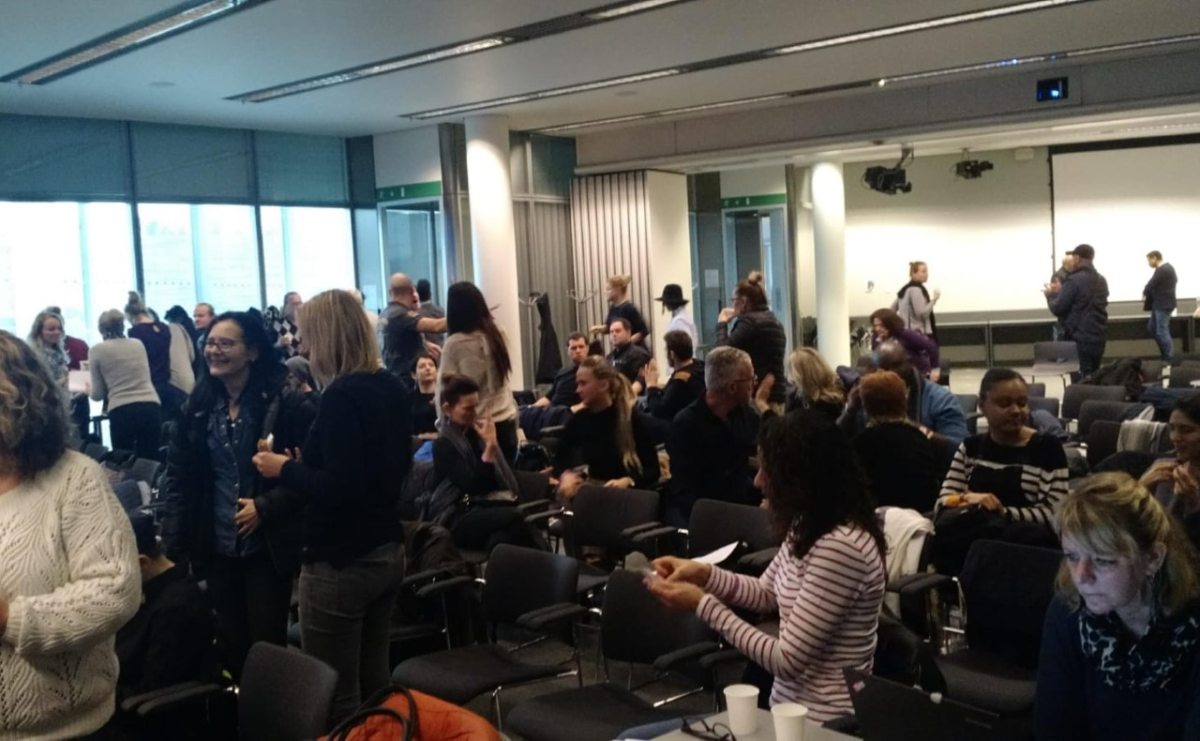by Sanchayeeta Iyer, 6 May 2019
With the deadline for the UK to exit the EU looming near (at the time of writing, the deadline has now been extended to 29th of June), combined with the delay in achieving majority agreement in the house of Parliament on an exit deal, there is a sense of apprehension among citizens in the UK about how the withdrawal deal (or no deal) may affect them socially, economically and politically. Deaf people who need BSL access to understand what is going on with the current climate of Brexit can feel more confused and excluded. A new scheme of settlement in the UK is being introduced for EU citizens who live and work in the UK. The settlement scheme offers legal status, which enables EU citizens living in the UK the same access to work, study, benefits and public services as British citizens (except the right to vote). To find out more about the settlement scheme and to meet deaf EU citizens in the UK, on Saturday 16th February, Steve and I attended the “Brexit and You” event for disabled and deaf people from EU countries.
The event was organised by Disire (a charity organisation which campaigns for the rights of international disabled people and their carers to reside in the UK), and New Europeans (a civil rights organisation which campaigns for the freedom of movement in the EU). The aim of the session was to provide clear, concise and accessible information for deaf and disabled people about the new Settlement scheme and online application process. BSL interpreters, a palantypist and handouts were provided in the event. Even though the event was aimed at both deaf and disabled people, most of attendants were deaf Europeans. There were also a few British deaf citizens present, who stressed they were attending in a capacity to gain information to provide feedback to other deaf people who could not attend the event. This represents a recognition that there is a far wider group of deaf migrants in London (and the UK) who require clear information, but also demonstrate an eagerness on the part of deaf British citizens to pass on details to ensure deaf EU citizens are fully aware of their rights after Brexit.
The panel was made up of the chair of Disire (Christiane Link), a Commonwealth Immigration advisor (Tim McMahon) and a professor from the university of York (Dr Charlotte O’Brien) who has conducted research on the impact on Brexit on disabled people in the UK. The session started off with an introduction from the Chair, she gave a brief talk about her experience about living in the UK as a European, disabled person (a wheelchair user). She spoke of the experiences of some disabled people in the UK who are either struggling to find employment or are unable to work due to their disability, and due to their being seen as dependent on social welfare, which may be seen as affecting their rights to remain in the UK. The organisation was set up to safeguard those rights.
A talk about the new settlement application process was given. It was explained that all the EU citizens (included those who hold a permanent residence document) who reside in the UK after five years of uninterrupted residence, need to apply for Settled Status. Those who have been living in the UK for more than 5 years need to apply for a pre-settled status. The deadline for applying is June 2021 (assuming that the UK leaves with a deal, if not, the deadline is 31st December 2020), thus, he explained that EU citizens have time to collect evidence of their residence (such as household bills or a letter from educational institutions) and process digital application. A step by step guide for applying online/digital application process (via android or Windows only) is available. The information and guide given in the session was repetitive and concise. It was mentioned that there will be a facility in CABs where the attendants can process their applications online if they do not have Android or PC. However, the panel did not take into account the fact the needs of deaf people attending the hub, where there is a high likelihood that the staff would be unable to sign and have adequate deaf awareness training. This can deter people from seeking support.

The questions and answers section were the interesting aspects of the whole event. The deaf attendants used the opportunity to ask questions that concerned their specific situations as BSL interpreters were provided. The deaf attendants just came in the front and signed their questions, which were wide ranging, for example: “what happens if my application for pre-settled status fails?”; “can I still go on holiday in European countries and do I need to pay for visas?” (from British passport holders); “can my friends from a particular European country come and settle in the UK?”; “how do I access the App if I don’t have an Android mobile phone?”, “where do I go to get help with communication if I don’t understand how to use the App?”. There were some questions that the panel were not in a position to answer due to the fact that the exit plan has yet to be confirmed. Even though the given information was repetitive and concise, there were still questions asked about the application process which showed that some deaf people have still not fully understood the information provided. Merely explaining the process step by step was not sufficient for some deaf people. BSL and English are not the first language for all deaf migrants and thus it can cause a challenge in the implementation of the individual application without any support. One deaf male attendant expressed his disappointment in the lack of social service support in his area to aid him with the application.
Steve and I got a sense that there was much apprehension among deaf people about conducting the application process independently, given that there are cuts in support service for deaf people. However, the deaf attendants agreed on the need to ensure that the applicants understood the given information in a different form (e.g. in a different sign language). The Q&A session overran its limited time and there seemed to be a great need for more information about Brexit in BSL format for deaf migrants and UK citizens. No further indication was given of future sessions and we are unaware of any information that organisations representing deaf people are setting these up, nor whether pressure is being put on the government to make information accessible in BSL. This adds up to a worrying concern given that Brexit will have such a huge impact on deaf (and hearing) citizens of the UK. In terms of the MobileDeaf research project, the meeting was a good example of the political climate under which we are operating as we seek to gather information from deaf migrants on their life and experience in the UK. It would be interesting to see whether there will be workshops or events that will be accessible to deaf people to explain the ongoing process in Brexit. That remains to be seen.







